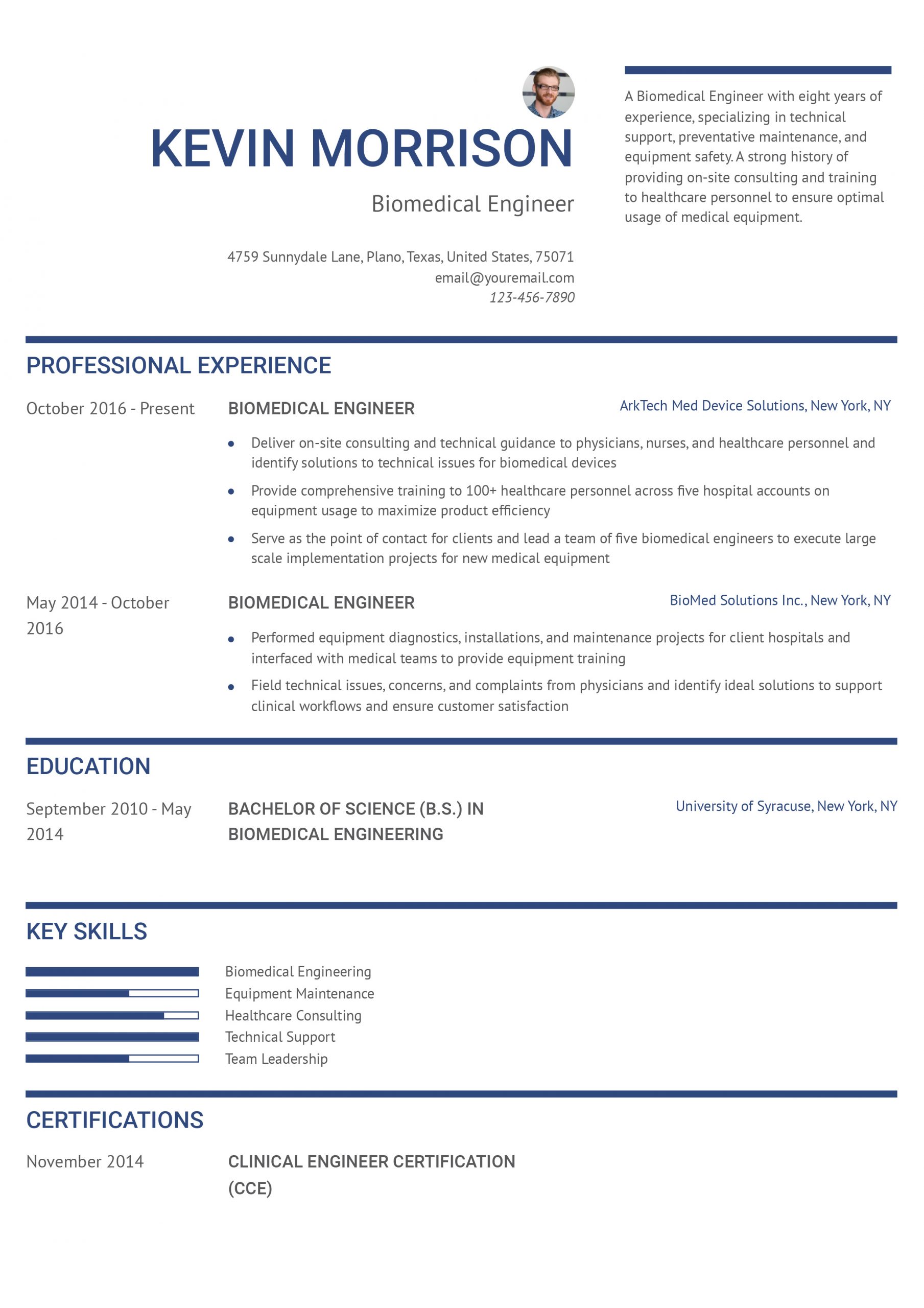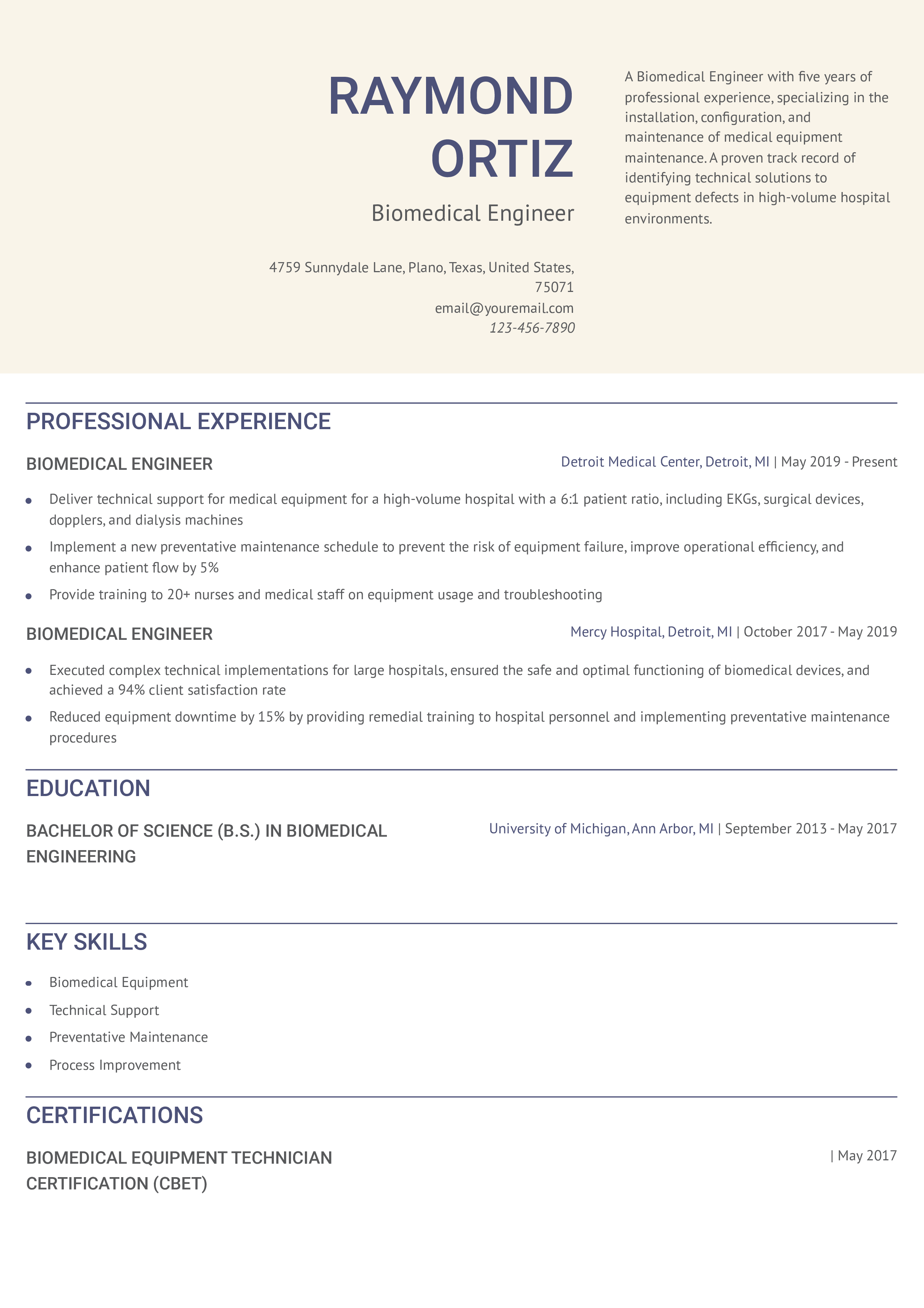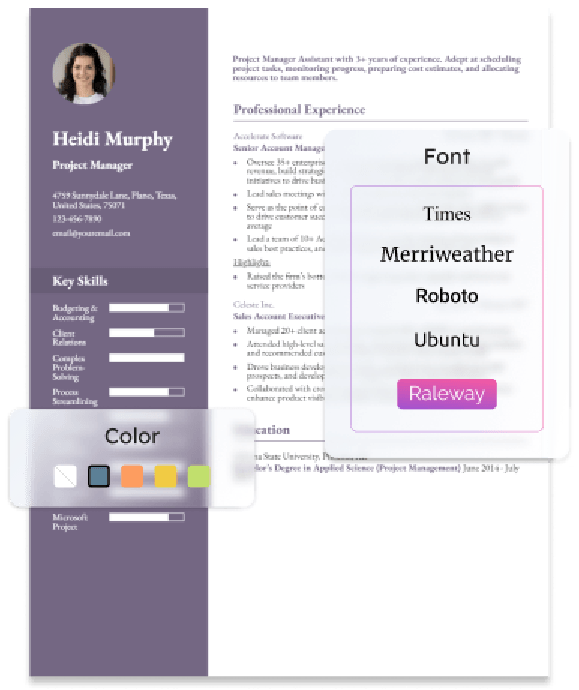- Entry-Level
- Mid-Career
- Senior-Level

Biomedical Engineer Text-Only Resume Templates and Examples
Kevin Morrison
(123) 456-7890
[email protected]
123 Bedford Avenue, New York, NY, 12345
A Biomedical Engineer with eight years of experience, specializing in technical support, preventative maintenance, and equipment safety. A strong history of providing on-site consulting and training to healthcare personnel to ensure optimal usage of medical equipment.
Professional ExperienceBiomedical Engineer, ArkTech Med Device Solutions, New York, NY
October 2016 – Present
- Deliver on-site consulting and technical guidance to physicians, nurses, and healthcare personnel and identify solutions to technical issues for biomedical devices
- Provide comprehensive training to 100+ healthcare personnel across five hospital accounts on equipment usage to maximize product efficiency
- Serve as the point of contact for clients and lead a team of five biomedical engineers to execute large scale implementation projects for new medical equipment
Biomedical Engineer, BioMed Solutions Inc., New York, NY
May 2014 – October 2016
- Performed equipment diagnostics, installations, and maintenance projects for client hospitals and interfaced with medical teams to provide equipment training
- Field technical issues, concerns, and complaints from physicians and identify ideal solutions to support clinical workflows and ensure customer satisfaction
Bachelor of Science (B.S.) Biomedical Engineering
University of Syracuse, New York, NY September 2010 – May 2014
- Biomedical Engineering
- Equipment Maintenance
- Healthcare Consulting
- Technical Support
- Team Leadership
- Clinical Engineer Certification (CCE), 2014
How To Write a Biomedical Engineer Resume
Biomedical engineers are a key part of the continuous improvement and advancements in the health care industry. Your resume should show you have a strong science background, lab experience, and the ability to be part of a team of researchers, developers, and testers. Use this resource — full of industry tips and resume examples — to guide your writing.
1. Write a dynamic profile summarizing your biomedical engineer qualifications
As a biomedical engineer, you’ve read countless scientific studies, and your profile is like the abstract of an article. It summarizes your skills, qualifications, and history in biomedical engineering and tells a hiring manager why you’re a top candidate for the position.
What keywords and skills you highlight in your resume depends on the type of position. A job in stem cell engineering for transplant research might require more focus on lab procedures and chemistry. But a position with medical devices would focus more on interacting with hospital personnel and performing diagnostics and maintenance on equipment.
Profile Example #1
A Biomedical Engineer with five years of professional experience, specializing in the installation, configuration, and maintenance of medical equipment maintenance. A proven track record of identifying technical solutions to equipment defects in high-volume hospital environments.
Profile Example #2
A Biomedical Engineer with eight years of experience, specializing in technical support, preventative maintenance, and equipment safety. A strong history of providing on-site consulting and training to healthcare personnel to ensure optimal usage of medical equipment.
2. Outline your biomedical engineer experience in a compelling list
A large component of your resume should focus on your professional experience. Previous experience as a biomedical engineer gives you a strong advantage. However, any experience in the science fields can be relevant, particularly if it’s in chemistry, biology, or medicine.
Use the job description to help you decide what responsibilities and achievements you include. Should the job ask for someone who can prepare documentation for regulatory submissions or provide technical support to medical staff, show your success at this in previous roles. If possible, add in metrics, such as “recommended modifications to medical devices that resulted in 10% increase in sales.”
Professional Experience Example #1
Biomedical Engineer, Detroit Medical Center, Detroit, MI
May 2019 – Present
- Deliver technical support for medical equipment for a high volume hospital with a 6:1 patient ratio, including EKGs, surgical devices, dopplers, and dialysis machines
- Implement a new preventative maintenance schedule to prevent risk of equipment failure, improve operational efficiency, and enhance patient flow by 5%
- Provide training to 20+ nurses and medical staff on equipment usage and troubleshooting
Professional Experience Example #2
Biomedical Engineer, ArkTech Med Device Solutions, New York, NY
October 2016 – Present
- Deliver on-site consulting and technical guidance to physicians, nurses, and healthcare personnel and identify solutions to technical issues for biomedical devices
- Provide comprehensive training to 100+ healthcare personnel across five hospital accounts on equipment usage to maximize product efficiency
- Serve as the point of contact for clients and lead a team of five biomedical engineers to execute large scale implementation projects for new medical equipment
3. Add biomedical engineer education and certifications
Jobs for biomedical engineers generally require a bachelor’s degree at a minimum. Senior-level positions may require a master’s degree or certificates. A degree in biomedical engineering is strongly preferred, but other science-based majors may also be applicable. List your education in its own section that’s clearly identified with a header.
Certificates show you have advanced training in specific procedures and industries. Highly valued certificates for this position include Certified Biomedical Equipment Technician (CBET), Master Certified Electronics Technician (CETma), Biomedical Electronics Technician (BMD), and Certified Biomedical Auditor (CBA).
Education
Template
- [Degree Name]
- [School Name], [City, State Abbreviation] | [Graduation Year]
Example
- Bachelor of Science (B.S.) Biomedical Engineering
- University of San Francisco, San Francisco, CA | 2011
Certifications
Template
- [Certification Name], [Awarding Organization], [Completion Year]
Example
- Biomedical Equipment Technician Certification (CBET), Association for the Advancement of Medical Instrumentation | 2013
4. List key biomedical engineer skills and proficiencies
Hiring managers can be inundated with resumes, often getting hundreds of applications for one opening. Applicant tracking systems (ATS) help sort these applications, weeding out candidates who don’t have the minimum qualifications or identifying the strongest contenders.
Adding a skills list to your resume can help you by giving you an easy place to add in keywords and tailor your resume to the job description. Use this list of common key skills for biomedical engineers as a starting point.
| Key Skills and Proficiencies | |
|---|---|
| Biomedical engineering | Cardiovascular devices |
| CBET | Clinical engineer certification (CCE) |
| Clinical workflows | Diagnostic equipment |
| EKGs | Equipment maintenance |
| Equipment repair | Health care consulting |
| Medical devices | Medical equipment |
| Process improvement | Product testing |
| Preventative maintenance | Staff training |
| Surgical devices | Technical support |
| Troubleshooting | |
How To Pick the Best Biomedical Engineer Resume Template
A template can make it easier to create your resume by taking care of the formatting, but choosing the wrong template could put your resume at the bottom of the pile. Look for clearly defined sections, separated with horizontal lines or by bold formatting. It should start with your contact information and then list your profile summary, professional experience, education, and key skills.
Stick with a plain template that’s clean and easy to skim. Nontraditional fonts, colors, and design flourishes can distract from your qualifications and come across as less than professional.
Frequently Asked Questions: Biomedical Engineer Resume Examples and Advice
What should I avoid when writing my Biomedical Engineer CV to ensure it's professional and impactful?-
To ensure your Biomedical Engineer CV stands out, avoid using generic terms or vague language. Focus on specific achievements with numbers and data that demonstrate your real-world impact. Also, be cautious of overloading the document with too much text or irrelevant information—keep it focused on your most relevant skills and experience.
What are common action verbs for biomedical engineer resumes?-
Coming up with a unique verb for every bullet on your resume can be a challenge. But specific, engaging language can make your resume more enjoyable to read and help it stand out. The list below can give you some ideas if you’re running out of words, but the job description can also offer valuable suggestions. For example, if the job posting says that “conducting research and modeling” are key responsibilities, use the verbs “conducted” and “modeled” in your job duties.
| Action Verbs | |
|---|---|
| Analyzed | Calibrated |
| Evaluated | Fabricated |
| Installed | Integrated |
| Investigated | Modeled |
| Modified | Optimized |
| Patented | Programmed |
| Prototyped | Published |
| Recommended | Simulated |
| Sourced | Standardized |
| Tested | Troubleshot |
How do you align your resume with a biomedical engineer job description?-
Technology is ever-evolving, and that’s even more true in the health care sector. The Bureau of Labor Statistics expects job openings for biomedical engineers to increase by 5% through 2032, which is faster than average.
It can be tempting to send out the same resume if you’re applying for similar positions. However, this can work against you. Instead, spend a few minutes aligning your resume to each job. Use keywords from the job description, and highlight must-have qualifications in the profile.
For example, if you’re working for a medical device company providing equipment to hospitals, you’d highlight your experience delivering on-site support and training to physicians, nurses, and medical staff. If a company is seeking a candidate to support research and development (R&D) initiatives, you could showcase accomplishments that reflect your ability to enhance the performance of medical device products.
What is the best biomedical engineer resume format?-
The best resume format is the one that fits your background and presents you as a well-qualified applicant. For most biomedical engineer candidates, the reverse chronological resume format offers the most opportunity to showcase your experience and skills.
Most of your resume will be spent listing your work history, starting with the most recent and working backward. If you have an extensive job history, focus on the most relevant positions instead of trying to fit in every job you’ve ever worked.
What’s the ideal length for a biomedical engineer resume?-
A one-page resume is ideal for most biomedical engineer positions, especially if you have less than 10 years of experience. For experienced professionals, a two-page resume may be appropriate, but only if it includes valuable, job-relevant content. Focus on showcasing your key achievements, certifications, and skills that align with the job description.
Aim to include work experience from the last 10 to 15 years. Older roles can be summarized or omitted unless they add significant value. Keeping your resume concise and relevant will leave a strong impression on hiring managers.
Craft your perfect resume in minutes
Get 2x more interviews with Resume Builder. Access Pro Plan features for a limited time!

It’s challenging to distill years of experience, education, and skills into a one- or two-page resume. Including a cover letter with your resume gives you another opportunity to discuss your achievements and connect with the hiring manager. See examples of engineering cover letters and get tips for writing your own in our guide.








